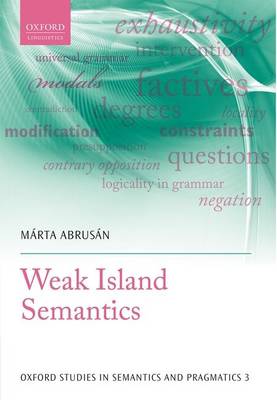
- Afhalen na 1 uur in een winkel met voorraad
- Gratis thuislevering in België vanaf € 30
- Ruim aanbod met 7 miljoen producten
- Afhalen na 1 uur in een winkel met voorraad
- Gratis thuislevering in België vanaf € 30
- Ruim aanbod met 7 miljoen producten
Zoeken
Weak Island Semantics
Marta (Permanent Research Scientist, Permanent Research Scientis
€ 66,45
+ 132 punten
Uitvoering
Omschrijving
This book presents a novel semantic account of weak islands, structures that block the displacement of certain elements in a sentence. Dr Abrusán's argument that the behaviour of these constructions has a semantic rather than syntactic explanation removes some of the most important reasons for postulating abstract syntactic rules as part of UG.
Specificaties
Betrokkenen
- Auteur(s):
- Uitgeverij:
Inhoud
- Aantal bladzijden:
- 272
- Reeks:
Eigenschappen
- Productcode (EAN):
- 9780199639397
- Verschijningsdatum:
- 20/02/2014
- Uitvoering:
- Paperback
- Afmetingen:
- 179 mm x 253 mm
- Gewicht:
- 484 g

Alleen bij Standaard Boekhandel
+ 132 punten op je klantenkaart van Standaard Boekhandel
Beoordelingen
We publiceren alleen reviews die voldoen aan de voorwaarden voor reviews. Bekijk onze voorwaarden voor reviews.







